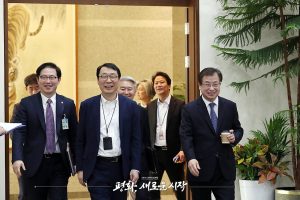Earlier this month, the national security advisor to former President Moon Jae-in, Suh Hoon, was arrested after rising suspicions about his role in two controversial incidents that occurred under the former Moon administration on the shared border with North Korea.
Two North Korean fishermen were captured by the South Korean Navy in November 2019 after their fishing boat crossed the inter-Korean maritime border. The captured men confessed to South Korean authorities that they killed 15 crewmen and the captain of the boat. At the time of the incident, the Moon administration announced that the two men did not intend to defect to the South, and that they were not qualified for protection under Article 9 of the North Korean Defectors Act because of their confession. The Moon administration decided to repatriate the fishermen, sending them back to the North without undergoing a formal trial or investigation.
The Moon government faced a deluge of criticism, particularly from human rights groups, following what has since been referred to as the “forced repatriation” of the two fishermen. Activists raised questions regarding the legality of the administration’s decision to return the two fishermen, citing domestic and international laws. For instance, the South Korean Constitution recognizes North Koreans as South Korean citizens, so South Korea usually accepts fleeing North Koreans within its borders. However, that was not the case in this circumstance.
Human rights activists also claimed that South Korea violated the United Nations Convention Against Torture, of which it is a signatory, which states that individuals should not be deported to countries where they will likely face torture. Similarly, as South Korea is a signatory to the Universal Declaration of Human Rights, the Moon administration was denounced by activists for not holding a fair trial for the two fishermen.
In September of 2020, North Korean soldiers fatally shot and burned the body of Lee Dae-jun, a South Korean Ministry of Oceans and Fisheries official. The Moon administration claimed that Lee, whose body was found by South Korean authorities drifting at sea, was trying to defect to the North. There has been controversy surrounding the Moon administration’s handling of the event and the explanation for Lee’s death, with his family members accusing South Korean authorities of not doing enough to protect Lee, and also using Lee’s gambling habits and personal issues as a cover-up for the government’s mishandling of the situation.
Since the installation of the new conservative government, President Yoon Suk-yeol has been bent on reversing the decisions reached by the former liberal Moon government. Yoon has opened investigations into the repatriation of the North Korean fishermen and Lee’s killing, arguing that in its attempts to appease North Korea and improve inter-Korean relations, the Moon administration intentionally mishandled these situations.
Criticisms of the Moon administration’s response to both of these incidents have been rising during the investigations. Recently released photos of the two North Korean fishermen, who appeared to be strenuously resisting being sent back across the border, reinvigorated anger from human rights groups, which argued that the fishermen’s resistance to returning to the North does not match with the Moon administration’s claims that the men were not seeking to defect.
Regarding Lee’s death, an inquiry and report by South Korea’s Board of Audit and Inspection found that the Moon administration made no meaningful attempts to save Lee, and that officials from Moon’s government withheld evidence that would have shown that Lee had no intention to defect to North Korea, contrary to the Moon administration’s previous announcement.
On December 3, Suh, Moon’s national security advisor, was arrested after being accused of covering up crucial circumstances regarding Lee’s murder. The Seoul Central District Court granted prosecutors’ requests to arrest Suh, citing concerns that he could destroy evidence related to the murder. Suh, and his spy chief successor Park Jie-won, also currently face charges filed this past July by South Korea’s National Intelligence Service, which accused Suh of forcibly closing an investigation into the North Korean fishermen, and accused both Park and Suh of destroying intelligence reports regarding Lee’s death.
On December 21, the prosecution secured testimony that the Defense Ministry ordered the destruction of intelligence reports regarding Lee’s death.
Moon has responded angrily to the current administration’s probe into the two incidents. In early December, he released a statement denouncing the Yoon government for politicizing sensitive national security matters.

































